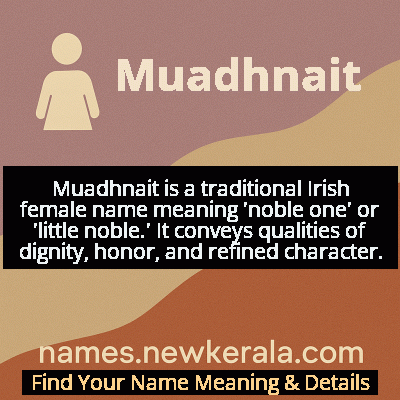Muadhnait Name Meaning & Details
Origin, Popularity, Numerology Analysis & Name Meaning of Muadhnait
Discover the origin, meaning, and cultural significance of the name MUADHNAIT. Delve into its historical roots and explore the lasting impact it has had on communities and traditions.
Name
Muadhnait
Gender
Female
Origin
Irish
Lucky Number
1
Meaning of the Name - Muadhnait
Muadhnait is a traditional Irish female name meaning 'noble one' or 'little noble.' It conveys qualities of dignity, honor, and refined character.
Muadhnait - Complete Numerology Analysis
Your Numerology Number
Based on Pythagorean Numerology System
Ruling Planet
Sun
Positive Nature
Leaders, ambitious, highly driven, self-reliant, innovative.
Negative Traits
Overly aggressive, domineering, impatient, selfish.
Lucky Colours
Red, orange, gold.
Lucky Days
Sunday.
Lucky Stones
Ruby, garnet.
Harmony Numbers
2, 3, 9.
Best Suited Professions
Entrepreneurs, managers, engineers.
What People Like About You
Courage, determination, leadership.
Famous People Named Muadhnait
Saint Muadhnait
Early Irish saint
Founded a convent in County Westmeath and is venerated in Irish martyrologies
Muadhnait Ní Dhomhnaill
Traditional Irish singer
Preserved and performed ancient Irish songs from the Donegal tradition
Muadhnait O'Connell
Academic and historian
Author of several works on early medieval Irish women's history
Name Variations & International Equivalents
Click on blue names to explore their detailed meanings. Gray names with will be available soon.
Cultural & Historical Significance
The name reflects the aristocratic nature of early Irish society, where noble lineage was highly valued. As a diminutive form meaning 'little noble one,' it suggests both status and endearment, typically given to daughters of noble families. The preservation of this name through centuries demonstrates the continuity of Irish cultural identity despite various historical challenges, including colonization and language shift.
Extended Personality Analysis
Women named Muadhnait are often perceived as possessing natural leadership qualities combined with a gentle, approachable demeanor. They typically exhibit strong moral character, intelligence, and a deep sense of responsibility toward their community and family. Their 'noble' nature manifests not in arrogance but in quiet dignity, reliability, and a tendency to put others' needs before their own.
These individuals often display remarkable resilience and inner strength, capable of handling challenges with grace and determination. They tend to be deeply connected to their heritage and values while being open-minded and adaptable to modern circumstances. Their combination of traditional wisdom and contemporary awareness makes them excellent mediators and community builders who can bridge different generations and perspectives.
Modern Usage & Popularity
In contemporary times, Muadhnait remains a relatively rare but cherished name, primarily used within Ireland and among the Irish diaspora seeking to preserve cultural heritage. While not appearing on mainstream popularity charts, it has seen a modest resurgence as part of the broader movement toward reviving traditional Irish names. The name is particularly favored by families with strong connections to Irish history and language, often chosen by parents who value both cultural authenticity and distinctive naming. Modern usage sometimes involves using the simplified form 'Mona' for everyday convenience while maintaining the full traditional name for formal occasions.
Symbolic & Spiritual Meanings
Symbolically, Muadhnait represents the enduring strength of Irish cultural identity and the preservation of ancient traditions in modern times. The name embodies the concept of 'nobility' not as inherited privilege but as earned through character, wisdom, and service to community. It symbolizes the bridge between Ireland's rich historical past and its contemporary identity, carrying forward the values of early Irish Christianity while adapting to present-day contexts. The name also represents feminine strength and leadership within cultural preservation, serving as a reminder of the important role women have played throughout Irish history in maintaining cultural continuity and spiritual traditions.

